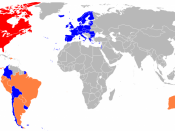The federal government claims that the Australia-United States Free Trade Agreement (FTA), which the respective countries' representatives agreed to in late January, will bring substantial gains to "Australia", because of the opening up of for Australian agriculture and manufacturing. Green Left Weekly's Graham Matthews spoke with David Glanz, who is contesting the Victorian seat of Wills for the Socialist Alliance in the coming federal election.
Why is Australian business so keen on the free trade agreement?
The agreement is very limited, and offers very limited opening up of markets. Some regard the deal as a set-back for the free trade agenda, because it is so hedged about in order to defend US interests -- particularly in the agricultural sector.
Nevertheless, the reason why the bulk of Australian capitalists have come in behind the deal -- and support such deals in principle -- is two-fold. Firstly they do want access to the US market, which is the most affluent and important in the world.
But secondly, they want to be able to tighten the screws on workers in Australia by arguing that there is no alternative to attacking pay and conditions.
Nowadays, anything that stands in the way of free trade -- including a strong public sector and decent wages and conditions -- is under attack.
Australian capitalists want to use the FTA as a battering-ram against the working class. They want to wipe out many of the historical gains that workers have made, including the social gains, which it could be argued they view as an impediment to, if not actually directly outlawed by, the FTA.
Alongside that goes the political imperative -- and this is where I think PM John Howard has been leading the charge -- to consolidate the political alliance with the US.
Washington sees free trade agreements as rewarding those countries that supported the coalition of the killing. John Howard, and Labor leader Mark Latham, build their foreign policy around an alliance with the US, and therefore want to bolster that with economic agreement. In all of that, I can see nothing -- or worse -- for Australian workers.
The deal will make it easier to privatise, by opening up access to US service companies. It is clearly laying the basis for undercutting the Pharmaceutical Benefits Scheme (PBS).
Even if some Australian companies gain US market share, those companies' workers will suffer in different ways, such as cut-backs to the public sector. Many of those areas which are likely to do better, such as agriculture, have a very small workforce, which is largely ununionised, and poorly paid, so the gain of a small number of lowly paid jobs in regional areas will in no way compensate for the general attack on jobs, conditions and services that workers will experience across Australia as a whole.
The FTA lays the basis for tariff elimination in the textile industry by 2015. That will eliminate thousands of jobs in the textile industry. What alternative do we have?
I think the federal government has given up on the textile industry, and is not concerned about jobs lost. Clearly a reduction in tariffs will make it easier for imported goods to replace Australian-made goods. And that's been the general pattern now for over 30 years of the reduction of tariffs in textiles.
Having said that, it is by no means the case that protection of existing tariffs -- or even an increase -- would lead to protection of existing jobs. The people who are cutting jobs in the Australian textile industry are, by and large, Australian manufacturers looking for the cheapest way to produce.
Even if tariffs were stable, enterprise bargaining and forcing productivity increases would drive down the number of jobs.
My personal view is that tariffs should not be reduced any further, but on the other hand we should not hold out the false idea to textile workers that maintaining or extending tariffs will save their jobs. What will, is fighting for those jobs: occupying factories that face closure, arguing for nationalisation of factories where the employer is cutting and running, and arguing for a living wage and job security.
This was the kind of platform that some of the leftwingers in the textile industry 30 years ago fought around. There was a challenge within the textile union which was based around the slogan "If your job's threatened -- occupy!". I believe that is just as applicable today, not just a thing of the past.
The Australian Manufacturing Workers Union's national leadership has claimed that the FTA will destroy the local manufacturing industry. Under its "rules of origin" goods purportedly manufactured in the US, but actually made largely in Mexico, could come in to the Australian market. Should we be trying to keep out manufactured goods made in Third World countries?
The threat to manufacturing jobs does not mainly come from the FTA. The rise in the Australian dollar, for example, has made it much more difficult for exporting industries to compete internationally. Another factor is the drive to raise productivity by multi-skilling, outsourcing and reducing staff. These are the things which threaten jobs in the manufacturing sector. So while I agree the FTA should be fought, it is not primarily because it is a threat to manufacturing.
There may be small sectors of manufacturing that may benefit from this agreement. The car industry for instance may benefit -- although those benefits might be wiped-out by the rise in the dollar. On the other hand, some sectors of the same industry are suffering from free trade agreements. The auto-components company Pilkington, for instance lost a contract with General Motors Holden, who switched to a Thai manufacturer because of the free trade deal with Thailand. A swathe of jobs have been lost from that one company.
So while the FTA is a gun that bosses can hold at workers' heads, the idea that we can simply defend jobs by opposing the FTA is wrong. If the FTA did not exist, the same employers would be coming back for speed-ups, and job losses and outsourcing regardless, because they argued they needed it even before the FTA.
I don't think the enemy of Australian manufacturing workers is either Mexican or North American workers, but rather our own employers. They'll be looking for ways to screw us down regardless.
The Australian media industry has been very critical of the FTA, particularly on the basis of the threat to Australian content on television. Should we protect the Australian culture industry?
As socialists we need to be wary of a knee-jerk reaction in defence of Australian culture. Australian culture can be sexist, racist, even chauvinist. It can also be wonderful and thought provoking. There's a huge difference between [the movie] Japanese Story and Neighbours. One contributes to culture, and one is a space filler. And I have to plead guilty; I watch lots of American programs and enjoy them.
There is no homogenous national culture that should be defended. There are jobs at risk in the media industry here, but those jobs are at risk all the time. Speaking as somebody who's in the newspaper industry and a member of the Media, Entertainment and Arts Alliance, I find it rather ironic that my union mobilises vigorously around the FTA when it has done nothing to stop the loss of jobs. All too often, the cry of "Defend Australian media!" becomes the alternative to actually fighting for jobs.
The government should make money available to the Australian film industry for new directors and storytellers to make movies and to market them. I think there is a useful creative and exciting element to culture in this country. But the idea that it is counterposed to US culture, or that it is automatically better if it is Australian is very dangerous. The real question is are there jobs in the industry, are there government subsidies for making movies, and ultimately, are we standing up against [media baron Rupert] Murdoch, as much as we are standing up against the FTA.
The Labor Party, the Democrats and the Greens have criticised the FTA for not giving Australia enough benefits. How would you respond to this?
I think you'd have to start by asking, "Which Australia?" Australia is enormously divided by class. Somebody living in Toorak in Melbourne, or Vaucluse in Sydney has a different life from those who live in the Broadmeadows, or the Bankstowns.
We have a small elite in this country who live quite different lives. This is the ruling class. These are the people who set the terms of a FTA, and when they say that Australia benefits, they mean that they benefit.
Our responsibility as socialists is to ask: "What's in this for working-class people? What's in this for us?"
I think you are going to see an offensive against us led jointly by the US ruling class and Australian employers, to wipe away barriers to the free movement of capital, to wipe away barriers to privatisation.
I am opposed to the FTA not because it is bad for "Australia", but because it is an attack on our living standards by both US and Australian bosses. We can reject the FTA in the kind of "little Australia" way that the Labor Party tends to do -- and even the Greens. Or we can reject it not because we are nationalists, but because we are internationalists. We want to resist it and make common cause with the working class across the world. We should see the FTA as a dagger pointed at the hearts of all of us.
US commentators in particular argue that the FTA is unfinished business. They would particularly like to limit, if not destroy, the PBS. How does SA think the FTA can be defeated?
The FTA will not come into force unless there are certain legal changes. These have to be passed through parliament. The first question is to build a movement to put pressure on the Labor Party, the Greens and even the Democrats to block these.
Secondly we need to oppose the notion that free trade is automatically not only a good thing, but also the only way we can go. We need to put up a political alternative based around international collaboration, rather than international capitalist trade and competition. We have to build the anti-war movement here as a political expression of that.
We have to do what socialists always have to do -- to go back to our friends and or workmates and argue that we have to defend our jobs and our conditions. That may be done politically through voting, or else by political mobilisations and sometimes it will be done through industrial action. The FTA can be blunted now and we can prevent its extension, such that our rulers dare not proceed with the next step.
Australia's economy is only 4% of that of the US. Does the Socialist Alliance think that Australia is at risk of becoming the 51st US state?
No. Australia is a powerful capitalist nation in its own right, particularly in the immediate South-East Asian and Pacific region. It has its own interests, which often run in the same direction as Britain and the US, but nevertheless we have our own ruling class who run Australia and want to continue to do so. Our capitalists want to be top dog in this region, but they also know that they can't be top dog over all. The people who run this county have no intention of subsuming their interest into that of the US.
So while there will continue to be US investment into the Australian economy, the largest destination for foreign investment by Australian bosses overseas is into the US.
Australia is an imperialist country in its own right, able to deploy substantial military forces in its own right. From the point of view of people in Indonesia and Papua New Guinea, it is Australia who casts the largest shadow.
The problem is not that Australia is becoming the 51st state. The problem is that the Australia of the ruling elite is a problem for the people of this region and a problem for the people of this country.



Make it make sense . . .
After reading your essay, I felt somewhat unsatisifed and disappointed. The topic is fascinating and could make a marvelous essay, but the way you structured it made it seem dull and confusing. The most irritating problem I found with your essay was that you never explained any of your impacts. You would present the reader with an idea, and then leave them hanging, wandering off to a new topic, and never picking up the thread of the former subject which you only introduced and never carried through.
Your writing style is highly interesting, especially your incorporation of slang into this essay. However, it seemed out of place at times, and I would remove the \"screw yous\" from it because it ruins the readers appreciation of the text.
Your introduction surprised me, and I would find it more appeasing if you were to more smoothly introduce the reader to the topic, rather than throwing them headfirst into the subject, causing them to be confused throughout the rest of the piece.
If I were you, I would also re-edit this essay and fix the grammatical errors strewn throughout it (the slang really does get too heavy sometimes)
This essay promises to be an interesting work, but you really must make sure you logically incorporate all your ideas into the essay so that there are not bits of extraneous information hanging around that only serve to confuse the reader. Once you achieve this, the essay will undoubtedly be an enjoyable piece of writing.
1 out of 1 people found this comment useful.